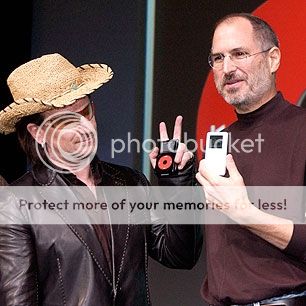By Brian Hiatt
October 7, 2011 6:10 PM ET
Bono and Steve Jobs announce the release of the U2 Special Edition iPod.
Tim Mosenfelder/Getty Images
Steve Jobs came out of a Sixties rock and roll ethos, which is fascinating.
That's the big story. If you asked in the Eighties, "Who is going to invent the 21st century," you'd probably have thought the Japanese or maybe the British or the Germans. No, it was sandal-wearing, anarchic music-lovers from California. And that is fucking great.
In the Sixties, bands from the Bay Area felt they were going to change the world, but they didn't. They changed my world, they changed your world, but they didn't change the world. Before that happened, they disappeared, like so many of us do, up their own rectum – drugs and the vicissitudes took their toll.
However, the next generation really did change the world. The people who invented the 21st century had their consciousness shaped by music and by powerful rock and roll music, and it's not just Steve Jobs, it was Paul Allen, it was lots of people. I once put this to Bill Gates, I said, "I know you probably didn't listen to Jimi Hendrix," and Bill protested, "Are you kidding me, in all my time with Paul Allen, how could I have not been shaped by Jimi Hendrix? That's all we heard 10 hours a day."
It's remarkable what's come out of Haight-Ashbury. The children of the Sixties are seriously changing the world. Steve Jobs is right up there, he is, in many ways, the Bob Dylan of machines, he's the Elvis of the kind of hardware-software dialectic. He's a creature of quite progressive thinking, and his reverence for shape and sound and contour and creativity did not come from the boardroom.
Does the Elvis analogy really hold up?
I really respect people who are involved in business who have an artist's eye and ear. There are very few. Steve was a very, very tough and tenacious guardian of the Apple brand, but the thing that endeared him to artists was his insistence that things had to be beautiful. He wasn't going to make ugly things that made profits.
The big lesson for capitalism is that Steve, deep down, did not believe the consumer was right. Deep down, he believed that he was right. And that the consumer would respect a strong aesthetic point of view, even if it wasn't what they were asking for. He believed that deep down, if he served what was right and what was great, then he would serve the Apple shareholder, and if he chased what they wanted, he would let them down.
What's the essence of his legacy?
This dude, my friend, and I'm proud to say, my colleague – he changed music, he changed film, he changed the personal computer. It's a wonderful encouragement to people who want to think differently, that's where artists connect with him. The picture of Einstein with his tongue sticking out, that's actually the very heart of the brand, and that's the punk rock piece, the attitude, and the anarchic mind that dreamt up the 21st century. That's a real encouragement for people who didn't go to an Ivy League school, who don't know how to use a knife and fork, who don't have the right accent. That anarchic West Coast "fuck off" attitude actually rules the 21st century. That's what's happening on the streets of Cairo, that's what's happening in North Africa – received wisdom is being balked at. A gnarly, singular point of view, like Steve Jobs, feels like a lighthouse spinning: When you're in the fog, you just go, "I'll go over there."
How did U2's association with Steve Jobs and Apple begin?
Steve was trying to sort out one of the fundamental questions of the age: is there any value to a musician's work? He thought that with iTunes, he could make it easier for people who wanted to respect intellectual copyright. So we had the idea to offer "Vertigo" for an iPod commercial, and we went out to see Steve at his house in Palo Alto and he was like, "What? You guys want to give me a song for a commercial? Wow, that's great, that's amazing." Then we said we wanted to be in the commercial, and he said "Maybe, yeah, I don't see why not."
Then we said we don't want to be paid, but we'd like a U2 iPod, a black one. His first response was, "That doesn't work at all. iPods are white!" But it turned out lots of people wanted them – and not because of U2. Because they were red and black!
I then pressed on Steve in terms of the global fight against AIDS, and his wife had been a great supporter of the Global Fund, which the UN had set up to try and get AIDS drugs to people, and Steve was very open to this and I can tell you that after his contribution to the (RED) Global Fund to buy drugs for people who would be dead without them, there are tens of thousands of people who owe the rest of their lives to Apple's commitment.
What was your relationship like?
In my own involvement with him, my real personal enjoyment of him as a man, he was a clear thinker, on lots of subjects, and I could turn to him. My actual last conversation with him was he called me because he was worried about my health, which is a clue to him. This tough guy was very tender, and he said, "I don't like the look of you, you look worn out," and I said, "What? I'm fine!" He wouldn't listen to me.
When I hurt my spine and I was in trouble, this package arrived of books and CDs and music and honey from their garden – tons of stuff arrived at the house. And so, yes, he was a captain of industry, a warrior for his companies. But I found him to be a very thoughtful friend, and a wonderfully detailed and interested parent of his kids, and lover of his wife. There were those two sides to him, the warrior, and then the very, very tender and soft-spoken side. I already miss him.





